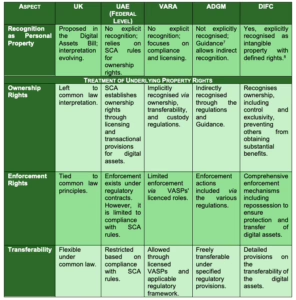January 13, 2025
From Chain to Claims: UK to put Crypto in Property Basket

KEY HIGHLIGHTS
- The UK Law Commission’s 2024 Property Bill proposes recognising digital assets, such as cryptocurrencies and NFTs, as personal property.
- The Bill introduces a third category of personal property, allowing the judiciary to evaluate the proprietary status of digital assets based on control, transferability, and exclusivity.
- The UK’s approach contrasts with the UAE, where multiple regulators provide partial or indirect recognition of digital assets as property. DIFC in the UAE stands out for explicitly recognising digital assets as intangible property.
INTRODUCTION
The digital age has revolutionised the concept of property, introducing assets such as cryptocurrencies, non-fungible tokens and digital carbon credits into the legal discourse. Recognising the inadequacies of traditional legal frameworks to address these emerging asset classes, the United Kingdom (“UK“) Law Commission proposed a legislative reform to include an additional category of personal property for digital assets. This culminated in the Property Bill (Digital Assets) tabled in 2024 (the “Bill“).[1]
In this article, we explore the key provisions of this Bill and its implications on the treatment of digital assets. We also compare it with the regulatory landscape in the United Arab Emirates (“UAE“).
RECOGNITION OF DIGITAL ASSETS AS PROPERTY
Traditionally, under common law, personal property is traditionally classified into two categories:[2]
- Things in Possession: Tangible, movable items such as gold bars or physical goods.
- Things in Action: Intangible rights that require legal enforcement, such as debts or contractual claims.
The UK Law Commission identified the inadequacy of these categories to accommodate digital assets, which led to the Bill for a third category of property rights. The Bill acknowledges a novel category of personal property. It establishes that a “thing” (including digital or electronic assets) cannot be deprived of legal status as personal property solely because it is neither a thing in possession nor a thing in action.[3] Notably, the Bill deliberately refrains from categorising specific digital assets as property, instead leaving this determination to the common law.
Why are personal property rights important?
Personal property rights are fundamental to numerous legal and practical contexts. They play a pivotal role in bankruptcy or insolvency proceedings, where the clear delineation of such rights determines how assets are distributed among creditors. These rights also serve as a foundation for remedies in cases where a digital asset is unlawfully taken, ensuring protection for rightful owners. Additionally, personal property rights provide the legal framework for succession upon death, ensuring clarity and certainty in the transfer of assets to beneficiaries. This adaptable framework allows courts to evaluate the proprietary status of assets on a case-by-case basis, considering factors such as control, transferability, and exclusivity.[4]
Implications
While the Bill is silent about the characteristics of third-category assets, implications are to be ascertained from the explanatory notes to the Bill, which detail that digital and electronic items could attract property rights. For instance, crypto-tokens, voluntary carbon credits, in-game digital assets, and domains will be considered property under the UK’s evolving interpretation.[5] This approach balances legal recognition with flexibility, enabling the judiciary to address complex questions about proprietary rights in digital contexts.
COMPARATIVE ANALYSIS: UAE’S APPROACH TO DIGITAL ASSETS
Multiple regulators shape the UAE’s regulatory framework for digital assets. Each regulatory body addresses specific aspects of digital assets, depending on their method of use and jurisdiction.
Federal Regulations
- Central Bank of the UAE (“CBUAE“): Primarily focuses on Payment Tokens[6] but stops short of explicitly recognising digital assets as personal property.
- Securities and Commodities Authority (“SCA”): Provides implicit recognition of ownership rights through licensing and transactional provisions. However, it does not formally confer the status of personal property on digital assets.
Financial Free Zones
- Dubai International Financial Centre (“DIFC“): Stands out globally as one of the few jurisdictions that explicitly recognises digital assets as personal property. The DIFC defines digital assets as intangible property, detailing their ownership, transferability, and enforceability rights.
- Abu Dhabi Global Market (“ADGM“): Offers indirect recognition of digital assets as property, primarily through regulatory guidance rather than explicit legal classification.
Dubai Virtual Assets Regulatory Authority (VARA)
VARA focuses on regulating Virtual Asset Service Providers (“VASP“) by emphasising compliance, licensing, and operational controls. However, it does not confer personal property status on digital assets.
A comparative analysis of the treatment of the digital assets by multiple regulators is outlined in the table below:

INTERNATIONAL PERSPECTIVES
Globally, jurisdictions differ in their approach to recognising and regulating digital assets as property. The spectrum ranges from progressive legal clarity to restrictive stances driven by concerns over financial stability and fraud.
- Singapore: The Singapore High Court has recognised crypto-assets as’incorporeal property rights’ enforceable under common law. [9] This recognition represents a significant step towards providing enforceability for digital assets in the country.
- United States: The US adopts afragmented approach, with federal and state laws often differing on whether and how digital assets are classified as property. This inconsistency complicates enforcement and legal certainty, depending on jurisdiction.
- India and China: Both nations adoptrestrictive stances on digital asset recognition. Regulatory measures focus on mitigating risks related to financial stability, fraud, and speculative trading, resulting in limited recognition of digital assets.
CONCLUSION
The UK’s proposed Bill marks a significant leap towards recognising the evolving nature of digital assets within legal frameworks. By introducing a third category of personal property, the Bill paves the way for nuanced judicial evaluations of ownership, transferability, and exclusivity in the digital age. While the UAE and other jurisdictions grapple with varied approaches to digital asset recognition, the UK’s initiative underscores the need for clarity and adaptability in regulating this transformative asset class. As global perspectives continue to diverge, the Bill sets a precedent for balancing legal innovation with the practical realities of an increasingly digital economy.
***
TLP Advisors is a dynamic and forward-thinking consulting, strategy and law firm specialising in providing cutting-edge solutions to our diverse clientele. With our roots deeply embedded in financial services, gaming, web3, and emerging tech, we offer unparalleled knowledge and support tailored to these rapidly evolving sectors’ unique challenges and opportunities.
TLP Advisors has consistently been the firm of choice for L1 chains, DeFi protocols, gaming companies, fintech and payment companies, foundations, funds, and investors. We have built a reputation for excellence through frequent collaborations with regulators, funds, and technology incubators. Our deep understanding of the intricate regulatory landscapes and industry dynamics allows us to provide strategic guidance and innovative solutions that empower our clients to navigate complex challenges and seize emerging opportunities.
www.techlawpolicy.com
***
[1] HL Bill No. 31 of 2024–25,
[2] Section 205, Law of Property Act 1925.
[3] Clause 1, Property Bill (Digital Assets) 2024.
[4] Paragraph 1.6, Digital Assets Report dated 27 June 2023 at: https://cloud-platform-e218f50a4812967ba1215eaecede923f.s3.amazonaws.com/uploads/sites/30/2023/06/Final-digital-assets-report-FOR-WEBSITE-2.pdf
[5] Please see explanatory notes at: https://bills.parliament.uk/publications/56208/documents/5089
[6] As per Section 2 (51) of the Payment Token Services Regulation, “Payment Token” means “a Virtual Asset which purports to maintain a stable value by referencing the value of:
- a) the same Fiat Currency as the Payment Token is denominated in; or
- b) another Payment Token also denominated in the same Fiat Currency.“
[7] Abu Dhabi Global Market’s Financial Services Regulatory Authority. ‘Guidance Regulation of Virtual Asset Activities’ (2023), Article 42 https://en.adgm.thomsonreuters.com/sites/default/files/net_file_store/Guidance-Regulation_ofVirtual_Asset_Activities_in_ADGM_(VER05.181223).pdf
[8] Digital Assets Law No. 2 of 2024.
[9] Paragraph 36, ByBit Fintech Ltd v Ho Kai Xin and others [2023] SGHC 199.